Members attend first Health Care Workers Council conference in five years
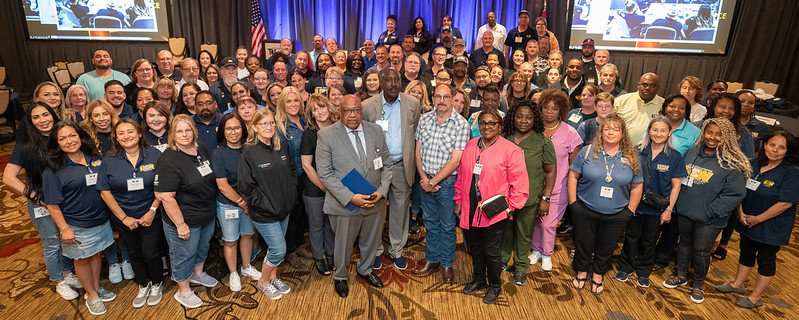
Desirae Beatty has been a certified nursing assistant (CNA) for 18 years. In that time, she and her co-workers have faced a lot of challenges when trying to provide the best care for the residents at Kane Community Living Centers in Pittsburgh, Pa.
They got a breath of relief and a shot of hope, however, when the 550 long-term care workers voted unanimously to join the USW in early 2022. Things have changed for the better, and Beatty, who now serves as unit president, said it’s all because they chose to organize with the USW.
“The USW helped us even when we weren’t in the union yet,” Beatty said to the nearly 200 union members and caregivers who attended the first USW Health Care Workers Council Conference in five years on July 23-27.
The week-long event – titled “Power to the People Who Care” – was held in Pittsburgh with a focus on health and safety, legislation and lobbying, and organizing.
“It’s an awesome experience to be here today with other health care workers,” Beatty said, while joining several other USW members in opening the conference on Mon., July 24. “I just hope we all recognize how powerful we are.”
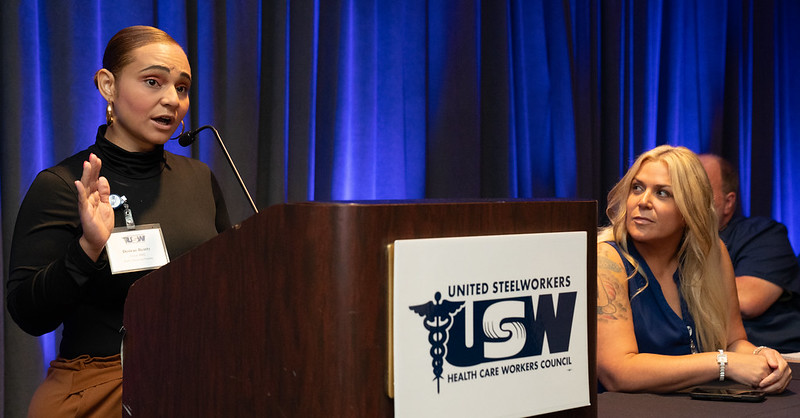
USW International Vice President of Human Affairs Kevin Mapp and Health Care Workers Council Coordinator Tamara Lefcowitz both welcomed the members to Pittsburgh and touched on how much the sector has changed since the last conference in 2018.
“The COVID-19 pandemic uprooted so many of your lives, both personally and professionally – which not only hindered our ability to come together in person but profoundly changed your jobs,” said Mapp.
Workshops throughout the first day of the conference focused on health and safety, including workplace violence. Members shared stories of violent incidents they or their coworkers have experienced, such as shootings, threats, spitting, and more.
Attendees were also able to participate in interactive sessions about safe patient handling and how to be effective stewards. Local 9201 Unit President Sarah Hardnett was grateful for what she learned in the safe patient handling class, where she was able to test new equipment first-hand.
“I’m going to try to bring some of these equipment ideas to our employer,” said Hardnett, who works in a long-term care center in Alabama. “It would stop people from getting hurt a lot.”
Former USW Vice President and current AFL-CIO Secretary-Treasurer Fred Redmond closed the first day with a nod to some of the victories that workers have won since the pandemic began, including Local 7600 and Local 9600 in California. He also highlighted the recent activism by members at Robert Wood Johnson in New Jersey and Essentia in Minnesota.
“Health care workers are tired of not getting the respect they deserve,” Redmond said. “We take care of our own, and our job never stops.”
Lois Palmer of Local 1207 is a long-term care aide in Canada who knows what it’s like to never give up and to always show compassion for her patients. This is why short staffing, the top crisis in the sector, is such a trying issue that has only grown worse due to the pandemic.
“Emotionally, everything got more draining, because you’re watching patients die more and suffer more,” said Palmer. “People are burned out and don’t feel they’re compensated enough, but employers know we’re not going to stop caring. It tugs at our hearts because we genuinely care about our patients.”
Because of this, she particularly enjoyed the conference workshop that focused on mental health and how workers can cope with stress, anxiety, and even post-traumatic stress disorder (PTSD).
Building legislative power
USW Rapid Response Director Amber Miller and Vice President at Large Roxanne Brown opened up day two of the conference, which focused on legislation and lobbying. Brown began by sharing stories about her mother, who worked as a critical care nurse in New York.
“I saw every day the struggle that it was for her as a single mom to do the job – actually, jobs – as a critical nurse, as well as the stuff she missed out on,” Brown said. “What she did, what you all do, is a sacrifice.”
Brown then spoke about some of the big legislative wins USW members helped to achieve in recent years, such as the Infrastructure Investment and Jobs Act. Along with allotting $550 billion in new federal investments, the bill also requires federal agencies to issue long-term contracts for American-made personal protective equipment (PPE).
Miller also updated the members on the Workplace Violence Prevention for Health Care and Social Service Workers Act, which union activists have been pushing for years to get passed at the federal level. It has passed the House of Representatives once and been introduced twice, most recently in April 2023.
“It’s not law yet, but we’re not stopping,” said Miller. “We’re using every vehicle to get this through.”
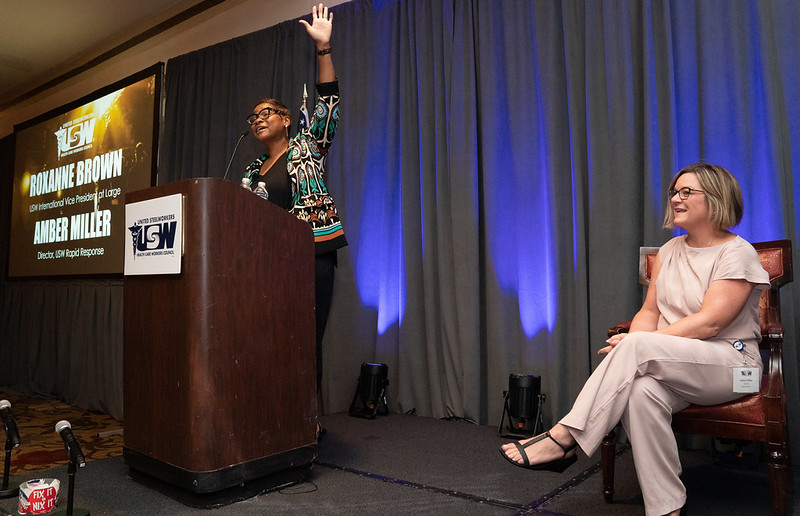
The second day’s workshops continued this legislative theme and centered around how to build collective power by talking to elected officials, bargaining access for reproductive care, advocating for safe staffing laws, and more.
The workshop slate’s goal was to empower members to take action like Amber Bagoly, a personal support worker. She and her union siblings of Local 8300 have been deep in the fight against the effort to privatize hospitals and clinics in Ontario, Canada.
Members of her local and many other unions across the province have taken to the streets and spoken with their legislators about the devastating impact of health care privatization. The group is also planning for a massive public demonstration on September 20.
“If they do privatize, we fear it will turn into the American health care system, which we don’t want,” Bagoly said.
Day three brought another diverse menu of workshops all focused on organizing and strategy, including how to do employer research, the importance of membership data, and getting ahead of decertification campaigns.
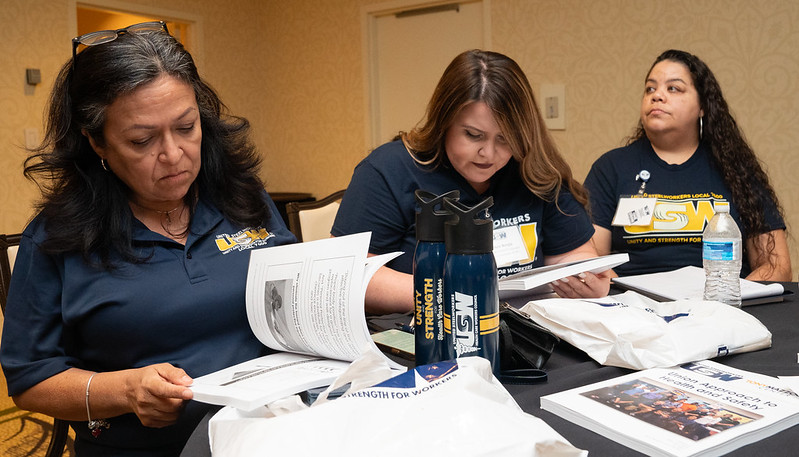
Breaking barriers and blazing trails
The conference concluded Thursday morning with a panel discussion featuring two USW members–Amber Stoer and John Diddle–who work in emergency medicine services (EMS). They shared their experiences providing ambulatory care in California and how they helped develop a training focused on workplace violence in their field, which they debuted in the union’s District 12 this past spring.
“We don’t have to accept violence as ‘just part of the job,’” said Stoer, recording secretary of Local 12-911.
The panel also included a documentary screening of Freedom House Ambulance: First Responders. Composed solely of Black men and women recruited from the city’s Hill District neighborhood, the paramedics of Freedom House Ambulance became trailblazers in providing pre-hospital and CPR care
John Moon, former Freedom House Ambulance Service paramedic and retired Assistant Chief with City of Pittsburgh Emergency Medical Services, also spoke on the panel about resilience and legacy.
“As I sit here, it came to me that just three miles away is where the vision of emergency medicine as we see it today began,” said Moon. “It really gives me great pleasure to talk about an organization that no one thought would succeed.”
Moon has also been working in recent years with UPMC on Freedom House 2.0, a project designed to recruit, train and employ first responders from economically disadvantaged communities, many of which have been significantly impacted by COVID-19.
USW members gave Moon and his fellow panelists a standing ovation, including Palmer.
“It was an eye opener for me,” Palmer said. “I really appreciate what these groundbreakers did, especially for us as Black people. They made it possible for us to do what we do today.”
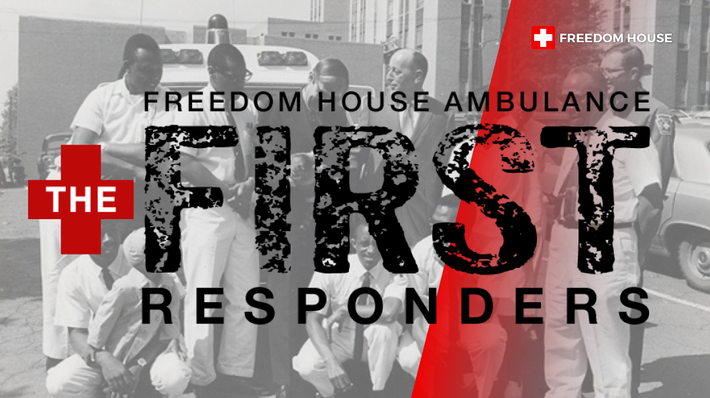
By clicking Sign Up you're confirming that you agree with our Terms and Conditions.
Recent News Articles
Want to Learn More?
See how the USW is making a real difference in our communities and our workplaces.